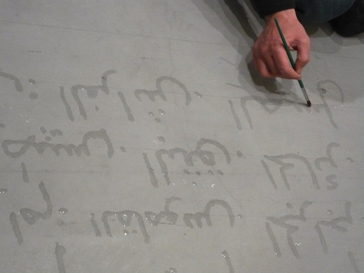
Born in 1966 in Gaza (PS). Lives and works in Paris (FR)

2008
Performance: brush, water, gray concrete floor
Year of Purchase: 2013
For me, and others like me who have burned with the wounds of water, Ibn Sida has set out the names of water and its attributes. What follows is only a drop from that flood: water, waters, waterfall, rapids, cataract, cascade, snow, ice, hail, backwater, backwash, aqueduct, torrent, soaker, spate, flood, deluge, mist, dew, steam, condensation, humidity, moisture, vapor, evaporation, aquifer, aquiclude, reservoir, freshet, brook, runnel, rill, rivulet, stream, creek, river, tributary, confluence, inlet, reach, slough, swamp, marsh, fen, puddle, pond, pool, tarn, lake, lagoon, cove, current, wave, eddy, whirlpool, undercurrent, billow, ripple, chop, surge, swell, spray, spurt, spout, squirt, splash, gurgle, gush, run, flow, meander, drip, ooze, seep, percolate, trickle, drop, leak, soak, drench, douse, dunk, dribble, inundate, saturate, irrigate, sprinkle, slosh, wash, dunk, dive, plunge, submerge, splatter, immerse, freeze, thaw, damp, wet, sodden, sopping, hydrous, aquatic, aqueous, watery… Let us bear in mind this poetic proliferation of water-naming words gleaned by the Palestinian poet Mahmoud Darwish (1941–2008) in his book, Memory for Forgetfulness,1 and translated from Arabic, which the Palestinian artist Taysir Batniji revives whenever he – or another – performs Like Water on the gray floor of an exhibition hall. To show water by writing with water; to show water – in its textual presence and by way of its limpid texture – in the sequence of 109 occurrences contained in the Arabic language, 109 synonyms inventoried in the eleventh century by the Arabic-Andalousian poet Ibn Sidah in his “Dictionary” (Mukham or Mufrassas)… Fragments of this glossary are picked up by Darwish2 in his account of the siege of Beirut by the Israeli army in August 1982 — where he sings about the water that a population is deprived of, water that is no longer shared — and then in turn reprised by Batniji in a performative act.
To write with water: there is a paradoxical redundancy in this gesture of literality which allows, in the time and space of the performance, to show language in its fragile outlines and then in its inevitable absorption by the very liquid it enunciates. To show the materiality of the aqueous element, then its gradual dissolution to the point of its effacement, its absence on the ground that has become the desert-like “skin” of language and of life. Water captured in its material, of which only trace minerals will remain after its passage, words of water captured in paint-brush writing, in the memory of the gesture of painting or drawing. It is a cautious, intimate, contemplative gesture which transcribes the metamorphoses and the metaphors of the present political state of the world. What remains of the word and its matter traced by the ephemeral? What remains of the “flesh of the words”?3 What remains of this glossary of abundance, a text-image of an endangered density? What remains of water, this vital “commodity” that is diminished with every passing day? Perhaps it becomes what Gaston Bachelard4 calls a “sort of a supple mediator between…” presence and disappearance, in the hollow of its image which recedes, disappears, an image becoming spectral, becoming absence. A present absence… This is one of the recurrent motifs in Taysir Batniji’s work,5 whether his engravings, series of photographs (Fathers , 2006; GHO809 , 2010), his videos (Gaza Diary , 2001; Transit , 2004), or his installations (Hannoun , 1972–2009).
Marjorie Micucci
1 Mahmoud Darwish, Memory for Forgetfulness: August, Beirut, 1982. Trans. Ibrahim Muhawi (California University Press, 2013), p. 36.
2 Darwish’s French translators note that “this passage is a free adaptation of an extract from the thematic dictionary by Ibn Sida, Andalusian scholar who died in 1066.” Similarly, the English translator remarks that “®ather than translate Ibn Sida literally, [he has] aimed for an equivalent effect.”
3 “It is the active flesh of the words that must be risked…” – Jacques Rancičre, The Flesh of Words: The Politics of Writing. Trans. Charlotte Mandell (Stanford University Press, 2004), p. 32.
4 “[water] becomes a sort of supple mediator between life and death” – Gaston Bachelard, L’eau et les ręves—Essai sur l’imagination de la matičre (José Corti, 1942).
5 Artist’s website www.taysirbatniji.com